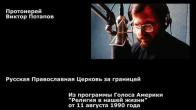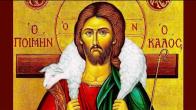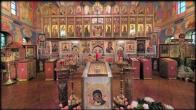ABOUT ORTHODOXY
You are here
The Parable of the Lost Sheep and the Lost Drachma
We find the parables of the "lost sheep" and the "lost drachma" in the Gospel according to Luke:
What man of you, having an hundred sheep, if he lose one of them, doth not leave the ninety and nine in the wilderness, and go after that which is lost, until he find it? And when he hath found it, he layeth it on his shoulders, rejoicing. And when he cometh home, he calleth together his friends and neighbours, saying unto them, Rejoice with me; for I have found my sheep which was lost. I say unto you, that likewise joy shall be in heaven over one sinner that repenteth, more than over ninety and nine just persons, which need no repentance. Either what woman having ten pieces of silver [drachmas], if she lose one piece [drachma], doth not light a candle, and sweep the house, and seek diligently till she find it? And when she hath found it, she calleth her friends and her neighbours together, saying, Rejoice with me; for I have found the piece [drachma] which I had lost. Likewise, I say unto you, there is joy in the presence of the angels of God over one sinner that repenteth (Luke 14:4-10).
Jesus Christ more than once used the image of the shepherd in His preaching, because His audience knew this image from the books of the Old Testament. The image of the shepherd, of the herdsman leading his flock, which was deeply rooted in the experience of the nomadic Arameans (Deuteronomy 26:5 [Russian Bible]), such as were the forefathers of Israel in the conditions of pastoral life, expresses two aspects of authority exercised over men, which are seemingly contrary and often divided. The shepherd is at once both a leader and a comrade. This is a powerful man, able to defend his flock from wild beasts; at the same time, he is attentive toward his sheep, knowing them well (Proverbs 27:23), adapting to their situation (Genesis 33:13), carrying them in his arms (Isaiah 40:11), even loving one or another of them as a daughter (II Kings [II Samuel] 12:3). His authority is indisputable; it is based on devotion and love. In the ancient East (in Babylon, in Assyria) the kings called themselves shepherds, on whom divinity had laid a definite ministry - to gather the sheep of the flock and to care for them. In the Bible likewise this image is often encountered, which helps us to understand the relationships that unite Israel with God through Christ and His envoys.
In the memory of many Jews, a prophecy of the coming Shepherd was preserved. Jesus fulfills this prophecy; probably, he included shepherds in the number of those little ones, who, like the publicans and harlots, joyfully accept the Good News - the Gospel. In this sense, one may interpret the reception shown by the shepherds of Bethlehem to Jesus, Who had been born in their cave (Luke 2:8-20).
In ancient Christian symbolism, discovered in the catacombs of Europe and the Near East, Christ was not infrequently depicted as a shepherd, bearing a sheep on his shoulders. This symbolizes the salvation of sinful humanity, when Christ on the Cross took upon Himself our sins and cleansed them.
In the parables of the lost sheep and the lost drachma, the Lord expounds the truth concerning how dear the conversion of a sinner is in God's eyes, and what joy there is in the heavens over those who repent. More than this, these parables emphasize that God Himself seeks out the sinner in order to save him. Christ speaks of this also in other places in the Gospel thus: For the Son of man is come to seek and to save that which was lost (Luke 19:10; Matthew 18:11) and to call…sinners to repentance (Matthew 9:13).
These parables were spoken by Jesus in order to show the proud and self-assured scribes and Pharisees God's boundless love and compassion toward all men without exception. The scribes and Pharisees were sure that, because they fulfilled all the minor prescriptions of the Mosaic law, offering the appointed sacrifices and keeping all the rituals, they no longer were in need of repentance and acted justly in avoiding contact with those whom they considered sinners.
From the Gospel, we know that Christ always went to meet all men who were conscious of their sinfulness and desired to change their way of life to the better. He readily went to the homes of sinners, did not disdain to eat with them (let us recall the occurrence with Zacchaeus, the tax collector, and the calling of Levy, the publican, to become the Apostle Matthew). This, too, is exactly what roused the indignation of the Pharisees and scribes, who considered that even to give a helping hand to a fallen brother or simply to touch him defiled them. Consequently, these supposed righteous ones thought that since Jesus consorts with sinners, He Himself is a sinner. Therefore, in their view there was no need for the people to follow Jesus and listen to his sermons and instructions. The unworthy leaders of the people openly spoke of this their indignation to Jesus and to others.
Christ says, as it were, to His accusers in reply: You bring an accusation against me that I accept sinners who have fallen away from God, that I even go after them, bring them to repentance and, saving them from perdition, return them to God. But, after all, you (scribes and Pharisees) also act likewise in regards to that which is near and dear to you. Further, Jesus offers to them the parable of the lost sheep and the lost coin. What man of you, having an hundred sheep, if he lose one of them, doth not leave the ninety and nine in the wilderness, and go after that which is lost, until he find it? Either what woman having ten pieces of silver [drachmas], if she lose one piece [drachma], doth not light a candle, and sweep the house, and seek diligently till she find it? If you act thus on losing your property, Christ further says, as it were, then why do you reproach Me, when I am saving men who have fallen away from God, their Father. A responsible, good shepherd, on finding a lost sheep, does not punish it because it fell away from the flock, does not even drive it back to the flock; but, rejoicing that he found it, takes it on his dependable shoulders and bears it home; he calls his friends and says to them: Rejoice with me; for I have found my sheep which was lost. I say unto you, that likewise joy shall be in heaven over one sinner that repenteth, more than over ninety and nine just persons, which need no repentance. This is how God rejoices when He returns the lost sheep of the flock to the path of salvation.
It is completely clear that the lost sheep stands for the sinner who is dead to virtue and blessedness, for which he was created by God. The lost drachma, that is, a small silver coin, is also just such a symbol. By the Holy Spirit, the Lord acts in inscrutable ways on the heart of the sinful man, who has not yet completely lost the capability for repentance and conversion to God.
Jesus' expression over one sinner that repenteth, which is repeated in both parables, draws attention to itself. By this, it is emphasized that the sole pledge of salvation is repentance. And joy…in heaven, according to the word of Venerable Ephraim the Syrian, is "a feast for God". "Repentance is a feast for God", writes the Venerable one. "Repentance, making a feast for God, summons heaven also to the banquet. The angels rejoice when repentance invites them to the supper. All the heavenly ranks celebrate, being aroused to gladness by repentance", we read in Venerable Ephraim the Syrian.
In the parable of the lost sheep, the Lord gives us an expressive, saving image of the bringing of a lost sinner to the path of truth. The sheep that had run away from the flock is a pitiful animal. It is subject to the danger of getting into a place where there is neither forage, nor water; the danger of becoming the prey of wild beasts threatens it. Thus, too, the soul which has withdrawn from God - the source of truth and grace - is also an unfortunate being, for it exposes itself to every kind of danger of the spiritual order: by delusions, by passions it is made an easy prey of the devil - the enemy of God and human salvation - who seeks, according to the word of Scripture, whom he may devour (I Peter 5:8).
The Lord shows maximum care for lost souls, which He boundlessly loves. God loves the world to such an extent that he gave his only begotten Son, that whosoever believeth in him should not perish, but have everlasting life (John 3:16). God gave His Son up to death on the Cross, conquered death by the resurrection of Jesus and after the Ascension to heaven continues to exercise providential care for sinners and indicates the path of salvation through His Church, which continues to call sinners to repentance.
In the parable of the lost sheep it is said that the shepherd, having discovered the lost sheep, does not drive it back to the flock, but takes it on his shoulders and with joy bears it home. The same thing also takes place with the sinner who is ready to follow after Christ. It is imperative that a sinner to begin his struggle of repentance freely, without coercion; at first it will be difficult for him, for he has become spiritually weak; help for him is essential. And here the compassionate Shepherd-Christ, by His grace, strengthens him who has decided to go on the path of salvation. The sinner no longer goes alone on the new path, but with Christ. If he should fall on the way - Christ will take him onto His shoulders, encourage and comfort him, for He said: Come unto me, all ye who labour and are heavy laden, and I will give you rest (Matthew 11:28).
These parables of the Saviour were addressed not only to the Pharisees of His time, but also to the Pharisees of all times and all nations. They are addressed also to us, as a warning not to fall into the sin of Pharisaism. The Lord desires that we would imitate his love for man, that with affection and love we would go to the help our lost brothers and sisters, in order to attempt to save them and return them to Christ's flock, to the Church. In each man we must see, namely, a brother - a brother in Christ and the image of God. And no matter how a man might fall, no matter how he might darken God's image in himself by sins and vices, we must, all the same, seek out in his soul God's spark, as Dostoevsky managed to do in his "Notes from the House of the Dead" (from hard-labour): "Sins are sins, but the image of God is the basis of man…", writes Feodor Michailovich. "Hate the sin, but love the sinner", the holy, righteous John of Kronstadt loved to say. And the Apostle James in his epistle says directly: "…he which converteth the sinner from the error of his way shall save a soul from death (both the sinner's and his own - V.P.), and shall hide a multitude of sins (James 5:20).
Whom does the Lord mean by the ninety-nine righteous and the nine drachmas? Since there are no men on earth who are not in need of repentance, Blessed Theophilact, the Archbishop of Bulgaria, and other interpreters of the Gospel understand by the ninety and nine just persons, which need no repentance the angels and the righteous, who have already completed their path of salvation and have departed to eternity, for whom the salvation of a sinner is also dear.
Nicholai (Velimirovich), the Bishop of Ochrid, provides a sweeping interpretation of the parable of the lost drachma, seeing in it a reflection of the tragedy of both the whole world and also of individual human existence. According to the interpretation of Bishop Nikolai, the nine drachmas that were not lost signify the nine angelic orders, which Christ, Who is depicted in the parable under the form of a woman, leaves, in order to find the one drachma - the whole human race, which had been seduced by the devil and at the very beginning of history had fallen away from God. Coming to the earth and having enlightened it with the light of His knowledge, Christ found erring and lost mankind and declared to the numberless host of holy, heavenly spirits: Rejoice with me; for I have found the piece [drachma] which I had lost, I have found the men who will fill up the place in the Kingdom of Heaven left after the fall of the angels away from God which had happened of old.
©V. Potapov
PARISH LIFE
Address of our Cathedral
Subscribe to our mailing list
While all the materials on this site are copyrighted, you may use them freely as long as you treat them
with respect and provide attribution on the Russian Orthodox Cathedral of St.John the Baptist of Washington DC.









